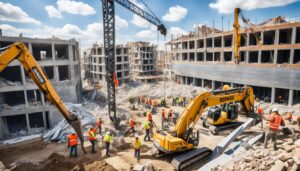War often destroys economies, leaving countries in pieces. This damage affects people, society, and the country itself. Everything from people’s lives to buildings are hit hard. The problems don’t stop there. There’s also less money, higher prices, and troubles with trading outside the country.
Putting these places back together is very hard. It involves thinking about many things. Like why the fighting started, how bad it was, and what the country was like before. It also needs countries around the world to help, and people who want to give money. To fix the economy, teams must do things like help right away, make services work again, and teach people new skills. They also need to make it safer and end anything left from when there was fighting. Money help and dealing with old debts are also very important. For it to work, the economy has to change, more businesses need to grow, and everyone in charge has to work together.
Key Takeaways:
- Post-conflict economic recovery faces numerous challenges due to the devastating impact of war on war-torn economies.
- The unique factors influencing each reconstruction effort include the causes of the conflict, extent of hostilities, initial economic conditions, international political support, and donor interest.
- Key tasks in economic reconstruction include relief work, rehabilitating basic services, developing human capital, reducing risk factors, and dismantling war economy structures.
- Aid flows and debt management are significant factors that impact the reconstruction process.
- Economic reforms, private sector development, and coordination among political authorities are crucial for successful post-conflict reconstruction.
Challenges in Post-Conflict Reconstruction
Rebuilding after conflict is hard. It aims to make things stable and stop violence from coming back. Places like Angola and Haiti show how tough it can be to bring peace. They highlight the struggle of healing societies torn by conflict.
When and how we rebuild matters a lot. It needs teamwork from many groups, like governments and NGOs. They work on fixing buildings but also on making systems that help society stay strong and peaceful.
Looking closely at real cases helps us understand better. It teaches us how to end violence and really make peace. We learn how pain affects healing and can find better ways to fix the problems.
Post-conflict work is always changing, without a simple plan for all. Every war is different, shaped by history and culture.
Studying what post-conflict societies face helps us find better ways. We work on changing power, including former soldiers back, and rebuilding trust. This is how we aim for peace that lasts.
The Impact of Instability and Violence
War’s effects last long and hurt in many ways. They slow down making money, break social ties, and can cause more wars. Making friends again is hard but key, needing fair systems and ways to look back at what happened.
Wars start from old anger and problems not fixed. So, rebuilding after should look deep. We need talks and ways to agree. This stops new fights from breaking out.
Reconciliation as a Key Objective
Post-war, making up is top priority. It means understanding, not just forgiving. Everyone involved, from those hurt to those who hurt, must help.
- Setting up truth and forgiveness groups
- Helping towns and cities make peace
- Getting different groups to talk and share
- Teaching about how to solve problems without fighting
These steps make healing and trust grow, which is the real base for lasting peace.
| Challenges | Key Considerations |
|---|---|
| Coordination | Making sure all groups work together well on fixing things. |
| Resource Constraints | Using what we have smartly because there’s never enough. |
| Social Fragmentation | Bringing divided groups back together as one. |
| Institutional Capacity | Helping leaders and groups be strong and fair for all. |
| Security Concerns | Keeping people safe as they rebuild their lives. |
Successful Post-Conflict Reconstruction Cases
Learning from successful post-conflict reconstruction cases helps us see what’s needed for a stable society. The Marshall Plan and Japan’s rebuilding after World War II are great examples. They show how global efforts can create peace by fixing war-damaged areas.
The Marshall Plan ran from 1948 to 1952. It aimed to fix the economies of European war zones, like Germany. The United States gave big money to rebuild things like roads, farms, and factories. This big push helped Europe get back on its feet, bringing peace and stopping new fights.
Japan’s rebuild post-World War II also stands out. General Douglas MacArthur and others led the work. They focused on making Japan peaceful, making their economy stronger, and setting up democracy. By spreading out power, improving schools, and building more, Japan quickly grew as an economic leader.
These cases show that many groups working together can do a lot. They show that fixing the economy, the government, and society together is key. It’s these full efforts that bring peace and progress.
We should learn from these wins to plan future reconstruction efforts. These strategies should keep peace, help heal old wounds, and stop new fighting. They need to focus on rebuilding, helping people come together, and making sure everyone has a say.
Lessons learned from successful post-conflict reconstruction cases:
- Collaboration between international organizations, NGOs, local and international governments, and the local population is crucial for effective reconstruction.
- Comprehensive approaches addressing economic, political, and social aspects foster stability and reconciliation.
- Investment in infrastructure, agriculture, and industry stimulates economic growth.
- Educational reforms empower future generations and promote stability.
- Decentralization of power and establishment of democratic institutions contribute to long-term stability.
- Support for and empowerment of local communities facilitate socio-economic recovery.
Following these practical tips can help in making better post-war plans. These efforts can help rebuild and maintain peace in regions affected by war.
Conclusion
Rebuilding after war demands a lot of thought, teamwork, and planning from multiple groups. It’s key to meet urgent needs, push economic changes, boost private businesses, and foster peace. Doing so helps make a society stable again.
When planning to reconstruct post-war, it’s vital to look at what makes each case unique. We must aim for growth that lasts, drawing from examples where efforts have paid off and facing the hard parts head-on. This is how we support lasting growth and repair economies hit by war.
FAQ
Why is post-conflict reconstruction important for war-torn economies?
What are the challenges in post-conflict reconstruction?
Can you provide examples of successful post-conflict reconstruction cases?
What are some practical recommendations for post-conflict reconstruction?
Why is it important to learn from successful post-conflict reconstruction cases?
Source Links
- https://pesd.princeton.edu/node/586
- https://www.usip.org/sites/default/files/rebuilding.pdf
- https://www.undp.org/publications/crisis-prevention-and-recovery-report-2008-post-conflict-economic-recovery-enabling-local-ingenuity
Disclaimer
All information on this website is of a general nature. The information is not adapted to conditions that are specific to your person or entity. The information provided can not be considered as personal, professional or legal advice or investment advice to the user.
This website and all information is intended for educational purposes only and does not give financial advice. Signal Mastermind Signals is not a service to provide legal and financial advice; any information provided here is only the personal opinion of the author (not advice or financial advice in any sense, and in the sense of any act, ordinance or law of any country) and must not be used for financial activities. Signal Mastermind Signals does not offer, operate or provide financial, brokerage, commercial or investment services and is not a financial advisor. Rather, Signal Mastermind Signals is an educational site and a platform for exchanging Forex information. Whenever information is disclosed, whether express or implied, about profit or revenue, it is not a guarantee. No method or trading system ensures that it will generate a profit, so always remember that trade can lead to a loss. Trading responsibility, whether resulting in profits or losses, is yours and you must agree not to hold Signal Mastermind Signals or other information providers that are responsible in any way whatsoever. The use of the system means that the user accepts Disclaimer and Terms of Use.
Signal Mastermind Signals is not represented as a registered investment consultant or brokerage dealer nor offers to buy or sell any of the financial instruments mentioned in the service offered.
While Signal Mastermind Signals believes that the content provided is accurate, there are no explicit or implied warranties of accuracy. The information provided is believed to be reliable; Signal Mastermind Signals does not guarantee the accuracy or completeness of the information provided. Third parties refer to Signal Mastermind Signals to provide technology and information if a third party fails, and then there is a risk that the information may be delayed or not delivered at all.
All information and comments contained on this website, including but not limited to, opinions, analyzes, news, prices, research, and general, do not constitute investment advice or an invitation to buy or sell any type of instrument. Signal Mastermind Signals assumes no responsibility for any loss or damage that may result, directly or indirectly, from the use or dependence on such information.
All information contained on this web site is a personal opinion or belief of the author. None of these data is a recommendation or financial advice in any sense, also within the meaning of any commercial act or law. Writers, publishers and affiliates of Signal Mastermind Signals are not responsible for your trading in any way.
The information and opinions contained in the site are provided for information only and for educational reasons, should never be considered as direct or indirect advice to open a trading account and / or invest money in Forex trading with any Forex company . Signal Mastermind Signals assumes no responsibility for any decisions taken by the user to create a merchant account with any of the brokers listed on this website. Anyone who decides to set up a trading account or use the services, free of charge or paid, to any of the Broker companies mentioned on this website, bears full responsibility for their actions.
Any institution that offers a service and is listed on this website, including forex brokers, financial companies and other institutions, is present only for informational purposes. All ratings, ratings, banners, reviews, or other information found for any of the above-mentioned institutions are provided in a strictly objective manner and according to the best possible reflection of the materials on the official website of the company.
Forex/CFD trading is potentially high risk and may not be suitable for all investors. The high level of leverage can work both for and against traders. Before each Forex/CFD investment, you should carefully consider your goals, past experience and risk level. The opinions and data contained on this site should not be considered as suggestions or advice for the sale or purchase of currency or other instruments. Past results do not show or guarantee future results.
Neither Signal Mastermind Signals nor its affiliates ensure the accuracy of the content provided on this Site. You explicitly agree that viewing, visiting or using this website is at your own risk.



